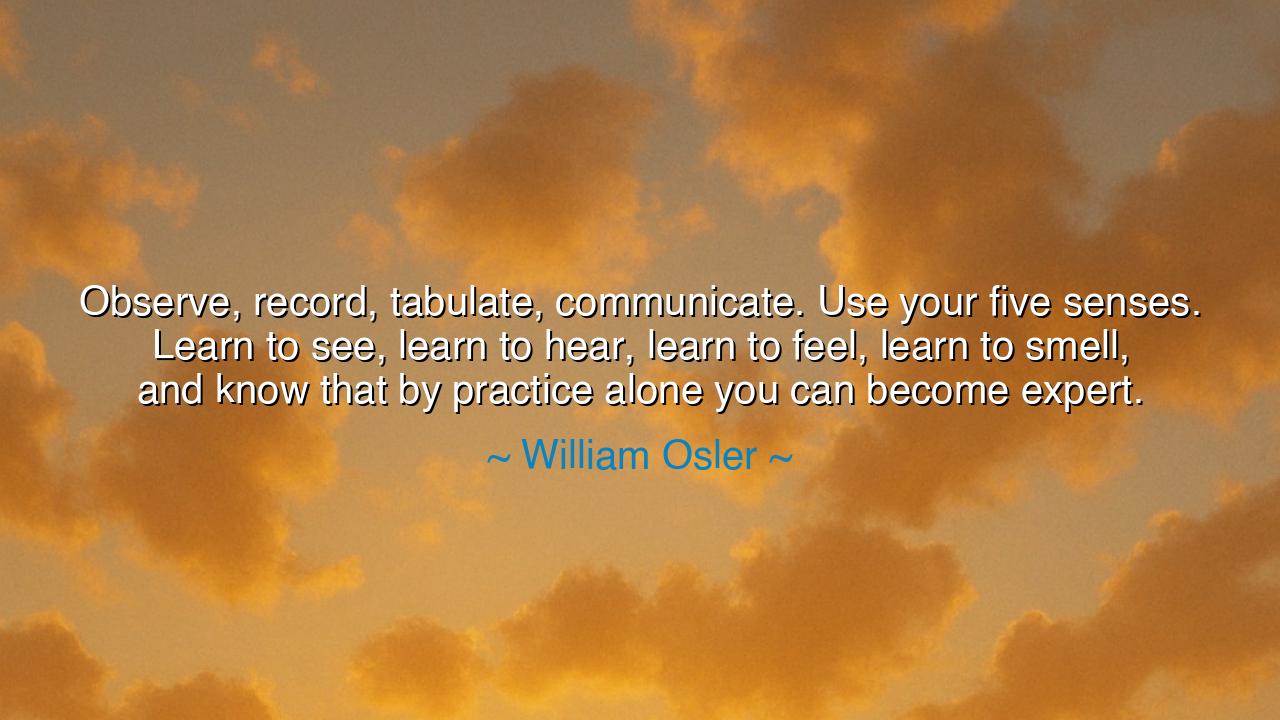
Observe, record, tabulate, communicate. Use your five senses.
Observe, record, tabulate, communicate. Use your five senses. Learn to see, learn to hear, learn to feel, learn to smell, and know that by practice alone you can become expert.






“Observe, record, tabulate, communicate. Use your five senses. Learn to see, learn to hear, learn to feel, learn to smell, and know that by practice alone you can become expert.” — Sir William Osler
These are the words of Sir William Osler, one of the fathers of modern medicine — physician, teacher, and philosopher of healing. With these words, he calls all seekers of knowledge, not just doctors, to awaken the discipline of attention. He reminds us that wisdom is not found in books or theories alone, but in direct experience, in the careful cultivation of the senses. To observe is to open the door to truth; to record and tabulate is to preserve what truth reveals; to communicate is to share that truth for the good of others. Through this sacred sequence — observation, reflection, and expression — Osler sketches the pathway from ignorance to mastery.
The origin of this saying lies in Osler’s lifelong devotion to the art of medicine. Born in 1849 in Canada, he became one of the great reformers of medical education, founding the Johns Hopkins Hospital and shaping the way generations of physicians would learn. In an age when many doctors learned from textbooks alone, Osler insisted that the bedside was the true classroom and that patients were the best teachers. His command to “use your five senses” was a call to return to the living world — to listen to the heartbeat, to see the pallor of the skin, to smell the sickness in the air, to feel the warmth or chill of fever. In this way, medicine, which was drifting toward abstraction, was restored to its human and empirical roots.
Yet Osler’s wisdom reaches far beyond medicine. He speaks of a universal truth: that knowledge begins with attention. The one who truly looks, listens, and feels will always understand more than the one who reads without experience. The senses are the gates of understanding, but they must be disciplined by practice. To “learn to see” is to learn to perceive beyond appearances; to “learn to hear” is to discern meaning in silence; to “learn to feel” is to be present with what is real. And this, Osler reminds us, is not a gift of birth but a skill earned through devotion. “By practice alone you can become expert.” In this, he echoes the wisdom of the ancients — that excellence is born not of talent, but of persistence and reverence for detail.
Consider the example of Leonardo da Vinci, the great artist-scientist, who spent hours studying the flight of birds, the anatomy of bodies, and the fall of water. His mastery came not from books but from a relentless observation of the world. He filled thousands of pages with drawings, measurements, and notes — a living echo of Osler’s injunction to “record and tabulate.” Leonardo saw what others overlooked because he trained his senses to wonder. Like Osler, he knew that to truly understand creation, one must first learn to behold it.
Osler’s command to “communicate” completes the circle. Knowledge hoarded dies in silence; knowledge shared gives life. The wise man does not observe merely for himself, but for the service of others. A scientist records not for glory, but to enlighten; a physician communicates not only findings, but compassion. Thus, in Osler’s teaching, the act of observation becomes an act of service — a way to participate in the healing of both body and world.
In his own life, Osler embodied this principle. He was known to walk hospital wards at dawn, quietly observing each patient, noting every small change — a deep breath, a tremor, a color shift in the skin. To him, these were not trivialities, but sacred signs. His students learned that medicine was not just science, but art guided by empathy and awareness. His legacy endures not in laboratories or libraries, but in the living practice of every physician who listens before diagnosing, who observes before assuming.
So, O seeker of mastery, remember this teaching: train your senses as you train your soul. Do not rush to conclusions or rely only on what others have said. See for yourself. Hear for yourself. Feel, taste, smell, and remember. Write what you learn. Speak what you know, not in pride, but in clarity. For the world belongs to those who pay attention. And as Osler teaches, through the humble repetition of awareness, the ordinary student becomes the expert, and the observer becomes the sage — one who sees not only the world as it is, but the truth hidden within it.






AAdministratorAdministrator
Welcome, honored guests. Please leave a comment, we will respond soon